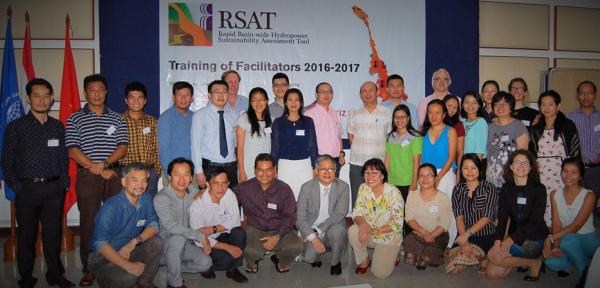Mekong River Commission trains facilitators on use of hydropower sustainability assessment tool
Vientiane, Lao PDR, 4 July 2016– More than 20 researchers, consultants and project managers from the MRC countries, China and Myanmar, attended a two-day preliminary workshop to become facilitators in the application of the Rapid Basin-wide Hydropower Sustainability Assessment Tool (RSAT).
RSAT is a multi-stakeholder assessment tool to identify development strategies, institutional responses, and management measures that could be applied to optimise the benefits and reduce the risks of hydropower projects. The MRC, the Asian Development Bank (ADB) and the World Wildlife Fund (WWF) developed it in 2010, and since then it has been used for the consultations of 10 projects in the Mekong sub-basins, prompting dialogue among multiple stakeholders in the development of hydropower dams.
The primary intent of the RSAT is to bring key stakeholders together and provide a common basis for dialogue and collaboration. Therefore, the Training of Facilitators, organised by the MRC and GIZ, will help participants develop skills including broad technical knowledge of all aspects of hydropower sustainability, understanding of institutional and stakeholder frameworks, and effective facilitation and mediation.
“I’m happy to see your commitment to this training (…) with your technical knowledge, your networks, as well as your social and language skills, you are instrumental in further developing and promoting RSAT in the Mekong basin”, said MRC’s CEO Pham Tuan Phan, adding that the tool is central to the future of sustainable hydropower development.
Throughout the training’s various phases, Voradeth Phonekeo and Praivan Limpanboon, MRC’s experts in hydropower development, will share their expertise and lessons learnt, drawing from their experience in developing and trialling the RSAT.
Peter-John Meynell, who has been instrumental in developing the tool, and Vincent Gruendler, an expert on facilitation and mediation skills, will lead the training, which will be delivered in three one-week training modules between September 2016 and March 2017. It will include home-based tasks and online tutorials complementing the participants’ learning process. Upon completion, participants are expected to effectively facilitate dialogue with multiple stakeholders, and design a project to put into practice what they’ve learnt.
“It is important to work together across borders and sectors in order to achieve sustainability in the long term. I believe the RSAT training will provide me with the skills, knowledge, and network to contribute to sustainable hydropower development in the region”, said one of the workshop’s participants.
The preliminary workshop is an opportunity for prospective candidates to show their knowledge in hydropower development, team work, language and presentation skills in order to be selected for the training and eventually become the facilitators that will promote, further develop, and expand the application of the RSAT in the Mekong region and beyond.

- Proposing solutions for water diversion and water connection in the North Central Region in order to optimize the capacity of water storing, regulating and distributing to meet the requirements of socio-economic development
- New approach to online hydrodynamic modeling in flood and inundation forecasting at the Institute of Water Resources Planning
- Grassroots-level acceptance of the State-level scientific research project: "Proposing solutions to prevent flooding and inundation for Bui river basin and surrounding areas" coded DTDL.CN-16/20.
- Training on Real Water Savings in Agricultural Systems (REWAS)
- JST is to fund six research projects for the e-ASIA Joint Research Program in the fields of “Advanced Interdisciplinary Research towards Innovation (Water Resource Management)” and “Environment (Climate Change Impact on Natural and Human Systems)”
- Technological capacities
- Final workshop of the project “Integrated and Sustainable Management of Red – Thai Binh River System in a Changing Climate (IMRR)”
- Training series on Remote sensing for Land and Water management
- Seminar “Integrated water management in the Red River: remote sensing and modeling for optimal reservoir management” at the IWRP
- Mini-seminar between Institute of Water Resources Planning and Collecte Localisation Satellites Group (CLS), France.
- Water Accounting for Vietnam Project Workshop at ADB Office in Hanoi
- Seminar on Cooperative training program "Application of remote sensing in water resources management"
- A two-day online training on Remote Sensing of Drought
- Science PhD thesis: Quantifying the distribution of alluvial Mekong Delta: Present and Future.
- Scientific and technology studies





















